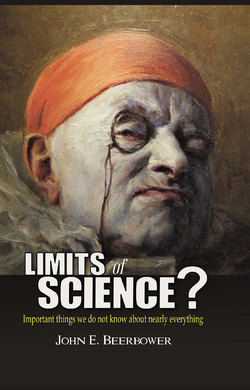Читать книгу Limits of Science? - John E. Beerbower - Страница 30
На сайте Литреса книга снята с продажи.
The “evolution” of science
ОглавлениеThus, I conclude on an ironic note. Throughout, I will regularly return to criticize the scientific status of the Darwinian theory of natural selection. However, it is an admittedly stubborn and pervasive paradigm of explanation in our “modern” thinking. Thus, one can picture the development or the “evolution” of science as a struggle for survival among opposing scientific models or theories in which, over time, the most “fit” or satisfying of which emerges. (As I explain elsewhere, the paradigms of natural selection and of competition have some important differences; although, many commentators treat them as if they were only different wordings for the identical idea.) It is not correct to say that the most “true” survives, since survival in the competition of ideas is not necessarily dependent upon truth or conformity to the real world. Instead, survival depends upon satisfying the needs and demands of the scientific community that is engaged in the competition. Presumably, the criteria of being most “fit” or satisfying should have some content beyond the mere fact of survival in the struggle. Here, the historian of science and the philosopher of science have something to contribute. They can look at how science has in fact “evolved” or developed over time and say things about why and how certain theories came to supplant other theories.
We may say that “fitness” of a scientific theory certainly means at least that the theory offers the promise and then is capable of achieving, possibly with manipulations and additional work, a consistency with observed phenomena and, hopefully, an ability to predict phenomena to be observed. Often, it will prove to have significant practical applications in the form of technology. We might also say that our world has advanced because of the power and success of the new theory. In part, however, the success is also due to the sense or experience of insight and understanding that the theory brings to us. We “feel” that we see more clearly. That scientific relevance of that feeling, unfortunately, is not subject (at least at this time) to empirical testing.
The Kuhnian observation that such an attribute of a new theory depends upon contemporaneous developments in other areas of science and, perhaps, in other areas of learning and culture is relevant. But, the element of potential interconnectedness itself does not tell us whether the experience of improved understanding reflects the identification or discovery of universal truths or simply the consequences of either innate or societally-derived biases of the human who achieves the feeling of understanding. Even if it is only one of the latter two, through a study of the methodological issues, there is at least the prospect of recognition of the biases and their sources and of resulting change and progress in the search for truth.
I am going to leave this subject at this point. These issues will come up repeatedly as we look at discrete areas of human knowledge. I am afraid that I will not have satisfactory answers in the end either; but, there will be more to say, and I think that some insights can be gained, with the perspective of the investigation of the foundations of various natural and social sciences.
